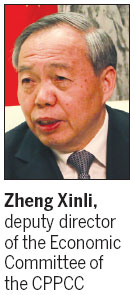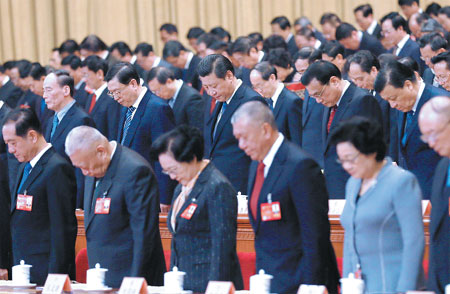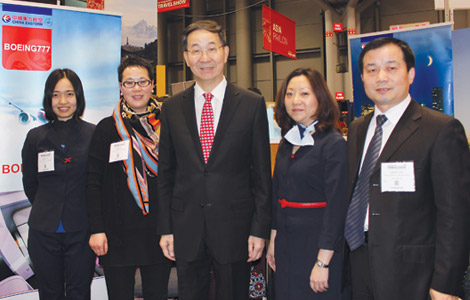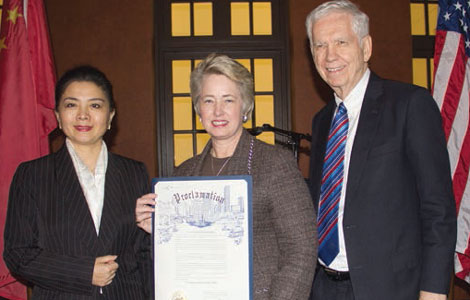China embraces market forces
Updated: 2014-03-04 12:39
By Zhang Yang in New York (China Daily USA)
|
||||||||
China is ready to give the market the "decisive" role in resource allocation in order to increase productivity, said Zheng Xinli, a member of thedraftinggroup for China's reform plans, in New York on Monday.
"Economic reform is the most important among all reforms, it leads reforms in all areas," Zheng said at the Chinese Consulate in New York, where he presented some of the highlights of theThird PlenarySession of the 18th Communist Party of China (CPC) Central Committee, which took place last November in Beijing.
"The first and foremost reform regarding the economy is that the market will play the decisive role in resource allocation," said Zheng, who is also deputy director of theeconomic committee of theCPPCC and permanent vice-chairman of the China Center for International Economic Exchanges.
"It used to be that the market played a fundamental role, but now we have changed that fundamental to decisive, which represents a breakthrough for Chinese leaders to recognize the importance of the market mechanism," said Zheng, emphasizing that the change of words carries a profound meaning for the Chinese economy.
"For the market to decide the reform of resource allocation is to create a social economic mechanism that will magically unleash productivity, so that the Chinese economy will continue to grow healthily in the relative long term and gradually catch up with developed countries," he said.

Zheng further explained that an emphasis on market mechanisms will help enterprises across sectors better balance their resources and decide what project to take on as well as what and how many products to produce based on market indicators.
"The government will no longer intervene in the allocation of resources to enterprises," he said.
Zheng gave as an example the banking sector, citing that during the first half of 2013, the total profit of 256 manufacturing companies was only about 56 percent of the total profit of the top five banks in China.
"That's why Beijing decided to change the monopoly situation and decrease the financing cost by encouraging competition in the banking sector," he said.
Zheng also mentioned the overcapacity issue in the industrial sector, hoping market mechanisms would alleviate that problem too.
"The profit is only 0.46 yuan ($.07) to produce a ton of steel, which is not even enough to buy a popsicle. The product's supply far exceeds demand and the price is in turn far below it value," he said. "But if the market decides the resource allocation, then these enterprises can put their money in sectors with higher returns."
The market mechanism is also expected to encourage survival of the fittest within each sector, stimulating the viability and creativity of companies through competition and capital markets.
Zheng said that the US helps capital get directed to companies with better prospects, such as Microsoft Corp, Apple Inc and Yahoo! Inc, through the stock market. But since the capital market is still underdeveloped in China, China has been unable to nurture such global giants.
Zheng underscored that it is crucial for qualified Chinese companies, especially SOEs, to go out and explore global markets. He said that China has $3.8 trillion foreign reserves, with more than $1 trillion holdings of US government debt with low return and high risks. Therefore China should not hoard the wealth but rather spend it abroad and find high returns.
yangzhang@chinadailyusa.com
(China Daily USA 03/04/2014 page2)
Most Viewed
Editor's Picks

|

|

|

|

|

|
Today's Top News
Michelle Obama, kids will visit China
China embraces market forces
Sino-Germany electronic trade surges
The bitter truth about too much sugar
US: Train depot attack 'terrorism'
US halts military engagements with Russia
First Lady to visit China in March
Terrorists in Kunming attack busted
US Weekly

|

|














